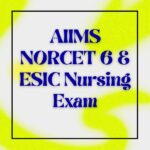Table of Contents
Important Points Related to Schizophrenic & Delusional Disorders
- The main types of schizophrenia are hebephrenic schizophrenia, catatonic schizophrenia, paranoid schizophrenia & schizoaffective type, etc.
- Waxy flexibility is a motor disturbance that is the predominant feature of catatonic schizophrenia
- Catatonic patients present two main types of picture
- Catatonic stupor and catatonic excitement
- Prolonged isolation can produce sensory deprivation, manifested by hallucinations
- Depersonalization is a state in which the client feels unreal or believes parts of the body are being distorted
- Looseness of association refers to sentences that have vague connections to each other.
- Echolalia is the involuntary parrot-like repetition of words spoken by others, whereas Echopraxia refers to the meaningless imitation of others’ motions
- Direct questioning is the most appropriate technique to use when interviewing a client with paranoid schizophrenia
- Eg: Are you hearing voices right now?
- Alcoholic beverages are contraindicated while taking an antipsychotic drug
- The bipolar affective disorder is characterized by cycles of extreme emotional highs (mania) and lows (depression)
- Taking the antipsychotic medication with milk, nicotine, and caffeine will decrease the effectiveness
- Referential thinking: When an individual incorrectly interprets neutral incidents and external events as having particular or special meaning for him
- Concrete thinking: It is the literal interpretation of words and symbols
- Clang Association: It is the linking of words by sound rather than their meaning
- The client may say “I like to drive my car, bar, tar, far.”
- Avolition is the lack of motivation
- Alogia also called poverty of speech, is a decrease in the amount of richness in speech
- A flat effect is the absence of emotional expression
- Haloperidol is an antipsychotic medication. It is also used to control tics and vocal utterances that are part of Tourette syndrome
- Never touch an agitated client, touch can be misinterpreted as a threat and can further escalate the situation
- Fluphenazine is an antipsychotic drug that can cause photosensitivity and sunburn
- The Prodromal (early) signs and symptoms of schizophrenia may include impaired role functioning and neglect of personal hygiene as well as social withdrawal and depression
- Disorganized schizophrenia is characterized by disorganized speech, disorganized behavior, and inappropriate or flat affect.
- A client with ideas of reference mistakenly believes that other people’s thoughts, speech, and behaviors refer to the client.
- Polyuria and polydipsia are common side effects of lithium.
- Orthostatic hypotension is an adverse effect of Tricyclic antidepressants
FAQs
Q: What is schizophrenia?
A: Schizophrenia is a serious mental illness that affects how a person thinks, feels, and behaves. It can cause a range of symptoms, including hallucinations, delusions, disordered thinking, and a lack of motivation.
Q: What are delusional disorders?
A: Delusional disorders are a type of mental illness that involve persistent, fixed beliefs that are not based on reality. These beliefs can cause significant distress and interfere with a person’s ability to function in daily life.
Q: What are the symptoms of delusional disorders?
A: The symptoms of delusional disorders can vary depending on the type of delusion a person is experiencing. Some common symptoms include a belief that someone is trying to harm or control them, a belief that they have a special power or ability, or a belief that they are being persecuted.
Q: What causes schizophrenia and delusional disorders?
A: The exact causes of schizophrenia and delusional disorders are not fully understood, but it is believed that a combination of genetic, environmental, and brain chemistry factors may play a role.
Q: How are schizophrenia and delusional disorders treated?
A: Schizophrenia and delusional disorders are typically treated with a combination of medication, therapy, and support from family and friends. Antipsychotic medications can help alleviate symptoms such as hallucinations and delusions, while therapy can help a person learn coping skills and strategies for managing their illness.
Q: Can people with schizophrenia and delusional disorders live normal lives?
A: With proper treatment and support, many people with schizophrenia and delusional disorders are able to live fulfilling and productive lives. However, it is important to continue treatment and regularly check in with a mental health professional to manage symptoms and prevent relapse.
Q: Can schizophrenia and delusional disorders be prevented?
A: There is no known way to prevent schizophrenia or delusional disorders, but early intervention and treatment can help reduce the severity of symptoms and improve outcomes. It is important to seek help if you or someone you know is experiencing symptoms of these disorders.
Latest Posts
- NVS Staff Nurse Vacancy 2024 – How to Apply

- AIIMS NORCET 6 and ESIC Nursing Exam Questions and Answers



- ESIC Nursing Officer Recruitment 2024 | 1930 Vacancies – Apply Now



- Dream Job Alert: AIIMS NORCET Nursing Officer Vacancy 2024 – Apply Now!



- NIMHANS Nursing Officer Exam 17-12-2023 Memory-Based Solved Questions



